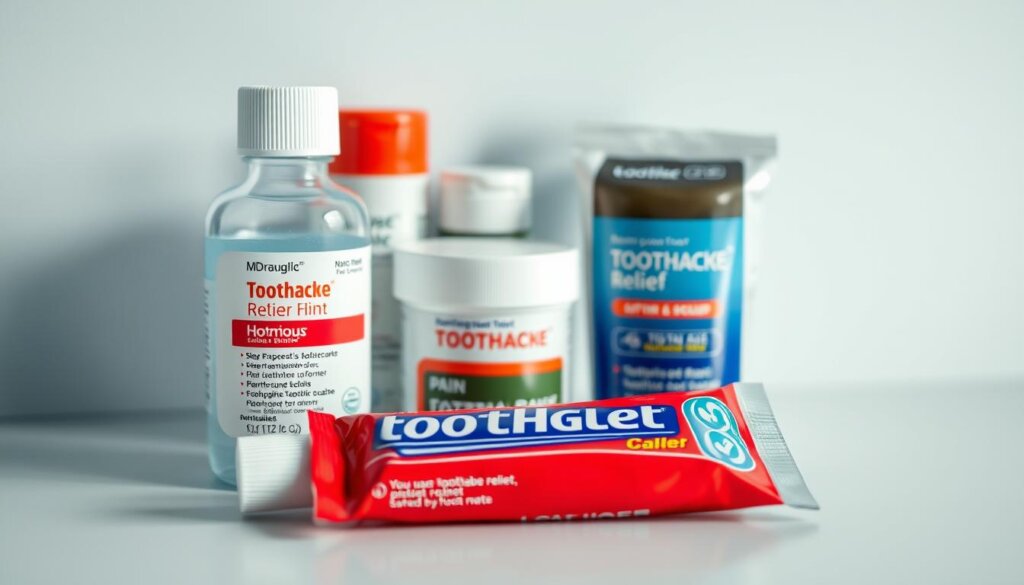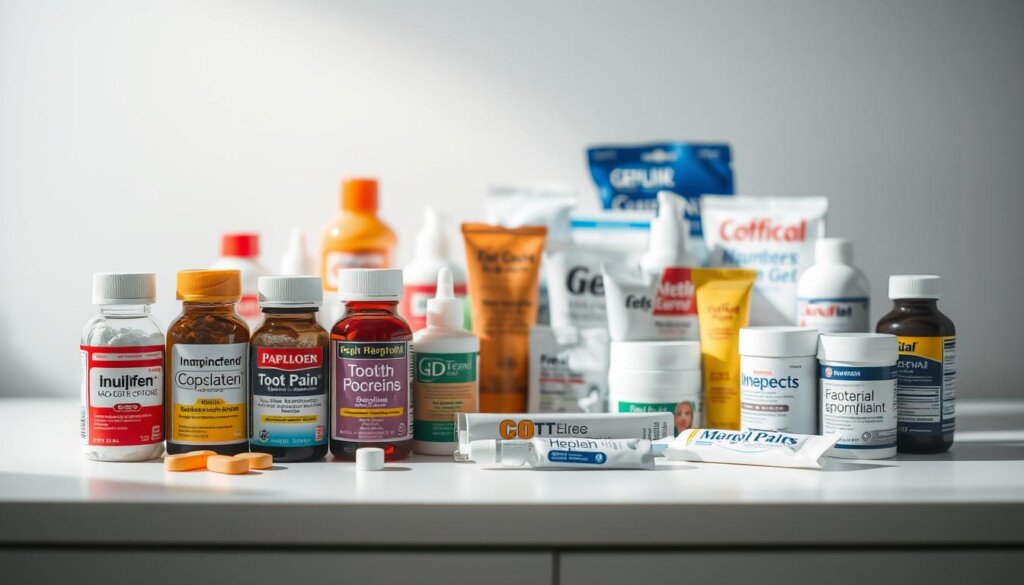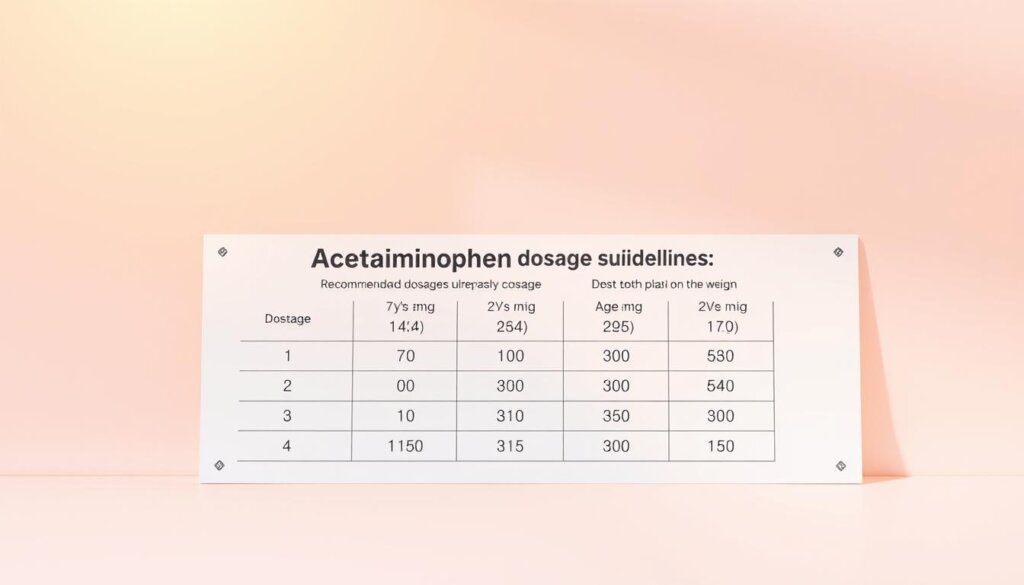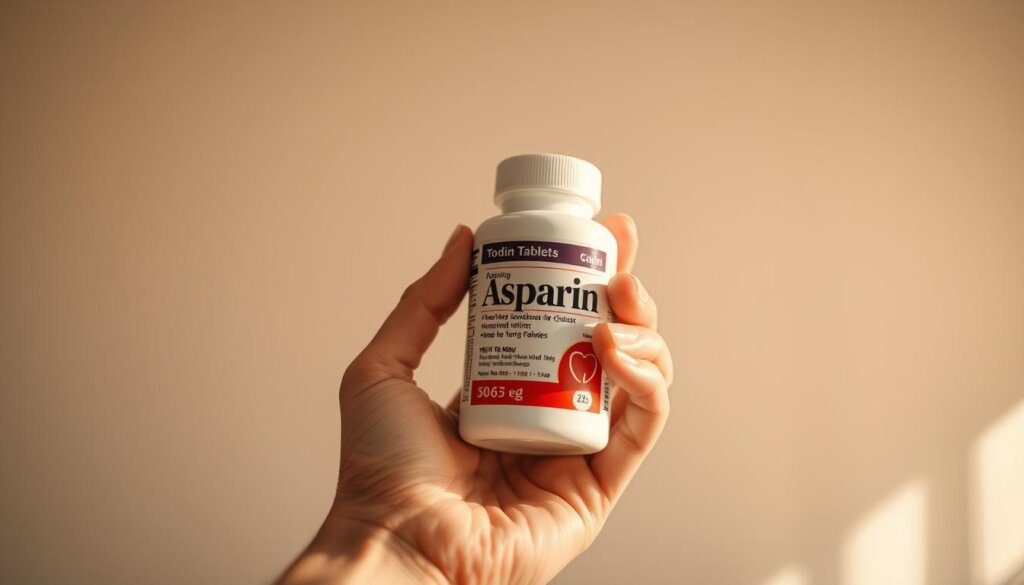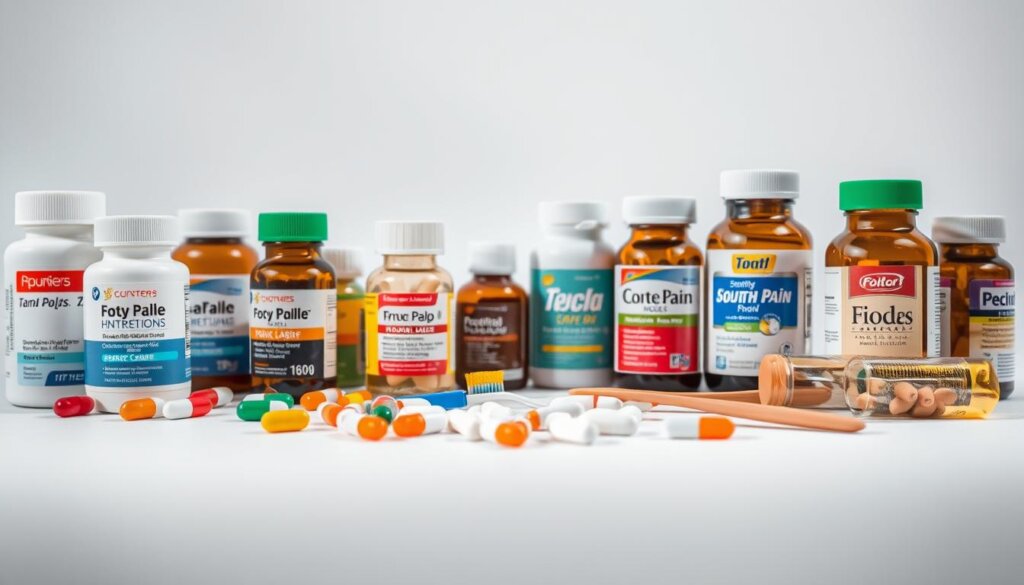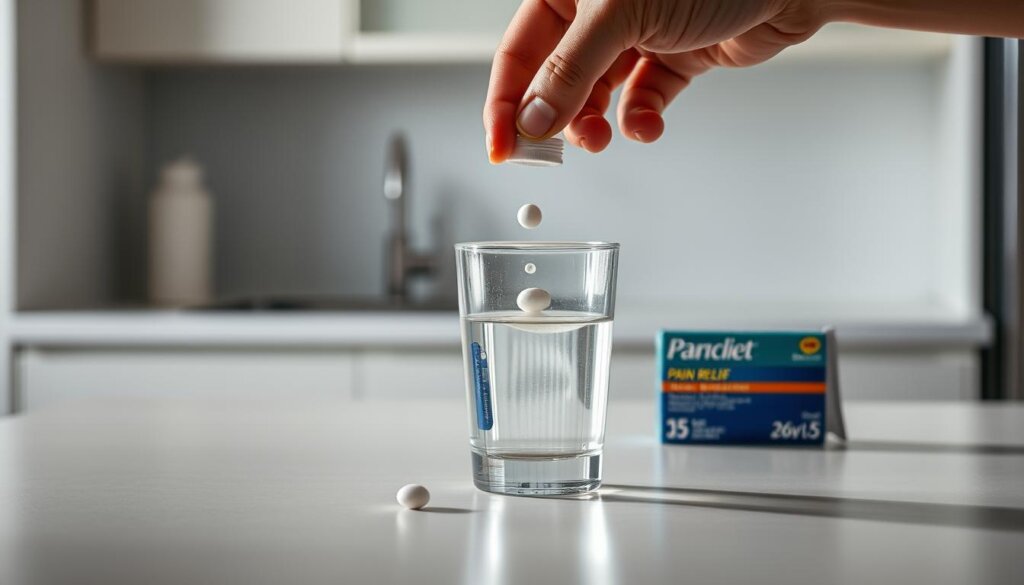What is the Best Over-the-Counter Painkiller for Tooth Pain?
Nearly one in four adults in the U.S. has untreated dental caries, leading to tooth pain. Toothache can be very distressing, pushing people to seek dental pain relief. The search for the best over-the-counter painkiller for tooth pain is crucial for wellness.
Choosing the right OTC painkiller is key to reducing toothache effectively. Ibuprofen, acetaminophen, and naproxen are the top picks, each with unique benefits. While ibuprofen and naproxen reduce swelling, acetaminophen is best for pain and fever reduction without anti-inflammatory effects.
Temporary relief can come from benzocaine gels or clove oil. Yet, it’s vital to use these remedies wisely to avoid risks like stomach issues from NSAIDs or liver problems from too much acetaminophen. Treatments like ice packs and saltwater rinses help too, but seeing a dentist is necessary if pain worsens.
img src=”https://seowriting.ai/32_6.png” alt=”Over-the-Counter Painkiller for Tooth Pain”>
Key Takeaways
- It’s important to know about dental pain relief and effective OTC painkillers for toothache.
- Ibuprofen and naproxen are great for swelling, while acetaminophen is ideal for pain without inflammation.
- Options like benzocaine gels or clove oil are for short-term relief, not long-term solutions for pain.
- Choosing an OTC painkiller also means considering potential side effects.
- Even with effective OTC options, consulting a dentist is crucial for ongoing or intense tooth pain.
Understanding Tooth Pain
Finding out why you have a toothache is key to feeling better. Tooth pain can come from many health problems. Knowing what causes your toothache is the first step to fix it.
Common Causes of Tooth Pain
Tooth pain has many different causes. Each reason needs its own way to fix it. Here are some common causes:
- Dental cavities which are spots of decay on the teeth surfaces.
- Gum infections that can extend to affect the root of the tooth.
- Cracked or damaged teeth often causing sharp, intermittent tooth pain.
- Exposed tooth roots, which can be sensitive to external stimuli.
These issues might be why people use tooth pain medication. Once you know the cause, you can find the right fix. This might mean simple drugstore remedies or more serious dental work.
Signs and Symptoms to Watch For
There are many signs of tooth pain. Knowing these symptoms helps you address the problem quickly. Look out for these warnings:
- Sensitivity to hot or cold foods and drinks
- Sudden pain when biting or chewing
- Persistent toothache that lasts for more than 48 hours
- Swelling around tooth or jaw
Seeing these signs means you should talk to a dentist quickly. Avoid trying to figure it out on your own. A dentist can give advice that’s right for your exact issue.
The Role of Over-the-Counter Painkillers
To find the best OTC toothache relief, knowing when and how to use these medicines is key. Doctors often suggest over-the-counter painkillers to ease dental pain. This makes them a top choice for relieving toothache pain.
How OTC Painkillers Work
OTC painkillers reduce tooth pain in two main ways. They lessen inflammation and directly relieve pain. For example, ibuprofen stops certain enzymes from making chemicals that cause pain and swelling. On the other hand, acetaminophen makes the brain feel less pain and can also cool down fevers. Both are good choices for how over-the-counter pain relief works.
When to Consider OTC Painkillers
Knowing when to take OTC painkillers is important for dealing with tooth pain well. They are best for quick relief of light to medium pain. But, be careful to avoid side effects. The American Dental Association says OTC painkillers are fine for simple toothaches. Always follow the package or a dentist’s instructions to avoid problems like stomach issues or liver damage.
| Painkiller | Type | Common Use | Consideration |
|---|---|---|---|
| Ibuprofen | NSAID | Reduces inflammation and pain | Check for stomach safety |
| Acetaminophen | Analgesic | Relieves pain and reduces fever | Monitor for liver function |
Types of OTC Painkillers for Tooth Pain
Choosing the right best OTC painkiller for toothache is very important. You can pick from acetaminophen, ibuprofen, or aspirin for tooth pain. Each one works differently and has its own benefits and possible downsides.
Acetaminophen is effective at easing pain and lowering fever. It stands out because it doesn’t reduce swelling. This means it’s a good option if you just need pain relief.
Ibuprofen is great for dealing with pain and also helps with swelling. It’s especially good for toothaches that cause your mouth to swell.
Aspirin can relieve pain and swelling too. But, it can upset your stomach, especially if you take a lot or often.
Here’s a comparison table to show you what makes each option unique:
| Painkiller | Property | Common Usage Note |
|---|---|---|
| Acetaminophen | Non-anti-inflammatory | Preferred for pain and fever relief |
| Ibuprofen | Anti-inflammatory | Useful for reducing swelling |
| Aspirin | Anti-inflammatory | Be cautious with gastrointestinal side effects |
Knowing these facts helps you choose the right best OTC painkiller for toothache for your needs. Always check the dosing instructions. Also, think about any allergies or health issues you have when picking your OTC tooth pain relief options.
Acetaminophen for Tooth Pain Relief
Acetaminophen is a trusted tooth pain medication known for easing pain. It’s best when you don’t need the anti-inflammatory effects of other medicines. Knowing the right acetaminophen dosage is key to using it safely.
If you’re an adult with tooth pain, you should take 500 to 1000 mg every 4 to 6 hours. Make sure your daily total doesn’t go over 4000 mg to avoid hurting your liver. Always follow the medicine’s label for safe use and to dodge bad side effects.
| Dosage | Frequency | Maximum Daily Limit |
|---|---|---|
| 500 – 1000 mg | Every 4 – 6 hours | 4000 mg |
Acetaminophen usually doesn’t cause problems, but some might feel nauseous or dizzy. Allergic reactions are rare. These issues are minor but talk to a doctor if they don’t go away.
- Check the label for specific acetaminophen dosage.
- Monitor total intake to avoid exceeding the daily maximum.
- Be aware of potential side effects and report any severe reactions.
To manage tooth pain well with acetaminophen, follow these steps. This ensures you get relief safely and effectively with this tooth pain medication.
Ibuprofen for Tooth Pain Relief
Ibuprofen is great for tooth pain. It cuts down both pain and swelling. This drug stops the enzymes that make pain worse, working well for dental pain.
Recommended Dosage for Adults
Adults should take 200 to 400 mg of ibuprofen for tooth pain. This can be done every 4 to 6 hours. But don’t go over 3200 mg a day to avoid bad side effects. Always stick to the advice on the dose and check with a doctor.
Possible Side Effects to Consider
Ibuprofen can have side effects like stomach issues or kidney problems. If you use it a lot or take high doses, these risks go up. Watch out for signs like stomach pain, heartburn, or constant nausea.
Taking ibuprofen can greatly help with tooth pain, especially if it’s from inflammation. But, think about your health and the risks of NSAIDs. Always talk to healthcare experts for safe use, particularly for long-term pain plans.
Aspirin for Tooth Pain Relief
Aspirin is a widely used painkiller that helps with tooth pain. It’s important to know how effective it is and to use the right doses. You should also be aware of any risks.
Aspirin reduces toothache pain because it fights inflammation. Adults should take 325 to 650 mg every four hours. Always take it with food to avoid stomach issues.
Recommended Dosage for Adults
Following the advised dosage of aspirin can maximize tooth pain relief. Taking too much can cause problems. Here’s what you should do:
- Start with a low dose of 325 mg per intake.
- Maintain intervals of at least 4-6 hours between doses.
- Do not exceed 3,000 mg within a 24-hour period.
Risks of Using Aspirin for Tooth Pain
While aspirin helps with pain, it can have risks. It’s important to use it safely to avoid harm.
- Increase in bleeding tendencies, especially for those with bleeding disorders or on anticoagulant therapy.
- Potential gastrointestinal issues, including ulcers and stomach bleeding particularly if taken on an empty stomach.
- Reye’s Syndrome, a rare but serious condition that can occur in children and teenagers recovering from a viral infection who take aspirin.
It’s essential to understand both the positive effects and risks of aspirin. Being informed about painkillers can help you safely ease tooth pain.
Comparing Pain Relief Options
Choosing between ibuprofen and acetaminophen for tooth pain is important. Each has its benefits and can better suit different health needs.
A detailed tooth pain relief comparison is key, especially with comparing OTC painkillers. How effective they are varies by the pain type, its severity, and your health.
| Medication | Typical Use | Benefits | Considerations |
|---|---|---|---|
| Ibuprofen | Tooth pain inflammation | Reduces inflammation effectively | Should be used cautiously by individuals with kidney issues |
| Acetaminophen | Mild to moderate tooth pain | Less irritating to the stomach | Not suitable for liver-compromised patients |
Picking the right OTC painkiller means looking at many factors. Your health and any side effects matter. A good look at ibuprofen vs. acetaminophen shows they work differently. The best choice depends on your health and the tooth pain type.
Natural Alternatives to OTC Painkillers
Many people look for natural toothache remedies for relief. They often choose clove oil for tooth pain and saltwater rinses. These methods are based on ancient herbal medicine and traditions.
Clove oil comes from the clove tree. It has eugenol, known for its pain-killing and germ-fighting qualities. Saltwater rinse benefits are also well-known. They’re simple but effective in soothing swelling and killing bacteria.
| Remedy | Primary Component | Known Benefits |
|---|---|---|
| Clove Oil | Eugenol | Analgesic and antibacterial properties |
| Saltwater Rinse | Salt | Reduces inflammation and bacterial activity |
If you have mild to moderate tooth pain, using these natural methods can help. They should be part of your bigger dental care plan. Remember, it’s essential to use them right. This way, they work best and support other treatments you might have.
How to Use OTC Painkillers Safely
When you have tooth pain, OTC painkillers can help a lot. But using them carefully is important to keep safe and avoid side effects. Knowing the right amounts to take and the dangers of mixing drugs is key to stay out of trouble.
Avoiding Overdose Risks
Always stick to the dosing guide on the box or what a doctor tells you. Taking too much can cause serious problems, like liver damage from acetaminophen or stomach bleeding from NSAIDs. Use alarms or a tracker app to remind you when to take your next dose.
Combining Painkillers: Is It Safe?
Wondering about mixing painkillers for toothache? It’s usually not safe to mix NSAIDs because of the risks of stomach ulcers and kidney issues. But you might be able to safely alternate acetaminophen and NSAIDs. This can work if ibuprofen isn’t enough on its own. Adding acetaminophen at different times might give better pain control without extra risk.
Still, always talk to a healthcare provider before mixing any meds. This ensures you’re doing it safely and effectively.
- Review medication labels carefully.
- Consult healthcare providers about safe combinations.
- Monitor for any signs of adverse reactions.
To sum up, being well-informed about safe OTC painkiller use, avoiding negative effects, and knowing about mixing meds safely are the main ways to handle tooth pain well and safely.
When to Seek Professional Dental Help
Knowing when to get dental help is key to stop further problems. It’s important to get both emergency and regular dental care. This keeps your mouth healthy.
Immediate dental attention may be needed for severe pain, red or swollen gums, or a fever hinting at an infection. These symptoms mean you shouldn’t wait for a regular dentist visit. It could prevent the need for big treatments later.
| Symptom | Recommended Action | Impact of Delaying Treatment |
|---|---|---|
| Persistent Toothache | Seek immediate emergency dentistry | Possible spread of infection |
| Swelling in Jaw or Face | Contact dentist immediately | Risk of abscess and more severe infection |
| Red or Bleeding Gums | Schedule a dental check-up soon | Could develop into periodontal disease |
| High Fever with Toothache | Urgent medical consultation recommended | Indication of spreading infection |
Also, regular dental care stops emergencies from happening. Dentists say to have check-ups twice a year. They find and treat problems early. This is key for people who often have tooth pain. It means smaller issues get fixed fast.
Other Remedies for Tooth Pain
While over-the-counter medications help, looking into additional toothache remedies is key for pain relief and dental health. Applying cold compresses and using certain dental products are beneficial in easing discomfort.
Cold compress benefits stand out by reducing swelling and numbing the sore spot. This method shrinks blood vessels near the tooth, cutting down on pain and swelling.
Cold Compress: How It Works
- Apply a cold compress to the cheek next to the hurting tooth.
- Keep the compress on for 15 minutes, then take a 15-minute break to avoid skin injury.
- Do this as needed to lessen the symptoms.
Dental care products’ effectiveness is also vital for tooth pain relief. Using mouth rinses with hydrogen peroxide for cleaning and fluoride to make enamel stronger helps a lot.
Dental Care Products That Help
| Product Type | Primary Benefit | Suggested Use |
|---|---|---|
| Medicated Mouth Rinse | Cleansing and disinfecting | Use twice daily after brushing |
| Fluoride Rinse | Strengthens enamel | Use once daily before bedtime |
| Night Guard | Prevents grinding that can worsen pain | Wear nightly as directed |
Adding these additional toothache remedies to your dental care can greatly improve tooth pain management. Embracing both cold compress benefits and the right dental care products is essential. They offer quick relief and help in preventing future dental issues.
Lifestyle Changes for Better Dental Health
Making key lifestyle changes can really improve your dental health. It’s important to understand how your diet affects your mouth. Also, keeping up with good oral care routines is essential. This helps prevent dental problems and keeps your mouth healthy.
Diet Considerations for Healthy Teeth
Eating right is key for strong teeth and gums. Foods like fruits, vegetables, dairy, and nuts are really good. Try to eat less sugary and acidic stuff to avoid tooth decay.
Here are tips for a tooth-friendly diet:
- Have more calcium-rich foods for stronger teeth.
- Choose water over sweet drinks to protect your teeth from acid.
- Eat crunchy fruits and veggies to clean your teeth naturally.
Importance of Oral Hygiene Routines
Staying on top of your oral hygiene is crucial. Brushing, flossing, and using an antimicrobial mouthwash help keep dental issues away. Don’t miss dental check-ups. They help catch and fix problems early.
Adopting these dental health habits can protect your teeth and gums. It’s also important to see your dentist regularly. This ensures your mouth stays healthy for a long time.
Pain Management for Long-term Relief
Achieving lasting toothache relief needs a well-rounded pain management plan. This plan goes beyond quick fixes. It includes everything from managing meds to daily prevention, showing how important ongoing care is.
To manage pain well, knowing all options is key. Comprehensive pain management means using both over-the-counter meds and home remedies. This helps deal with tooth pain as it comes and goes.
- Sticking to safe doses of medication is crucial to avoid making pain worse.
- Adding foods to your diet that fight inflammation and keep teeth healthy is important.
- Going to the dentist regularly for check-ups and cleanings can stop pain before it starts.
After taking these steps, it’s all about stopping pain before it happens. Pain prevention strategies aim to keep teeth healthy. They use advice from dentists and your own care routines, customized for you.
This approach doesn’t just stop pain now; it helps prevent future dental problems. It offers solutions that consider all aspects of dental health and pain management.
Frequently Asked Questions About Tooth Pain
We often get questions about tooth pain FAQs. We provide persistent toothache guidance and talk about the dangers of dental self-diagnosis risks. Knowing how to handle tooth pain is important to avoid big dental problems.
What to Do If Pain Persists?
When tooth pain won’t go away, you should act quickly but safely. First, rinse your mouth with warm salt water. This helps lower swelling and calm irritation. Also, you can take pain relievers from the store as instructed to ease the pain. Putting a cold compress on the area can numb it and bring down swelling too.
Is It Safe to Self-Diagnose?
Trying to figure out your own dental issues might seem easy, but it’s risky. You could misjudge how serious your condition is, missing things like infections or deep decay. Picking the wrong way to treat yourself could make things worse. If your symptoms are bad or don’t go away, it’s really important to see a doctor.
| Recommendation | Purpose | Benefits |
|---|---|---|
| Warm Salt Water Rinse | To soothe and decrease infection risks | Reduces swelling, cleans the area |
| Over-the-Counter Pain Relievers | To temporarily alleviate pain | Reduces pain, allows time to seek professional help |
| Cold Compress | To numb the affected area | Decreases inflammation and numbs pain |
Wrapping Up: Finding the Right OTC Painkiller
Choosing the correct OTC painkiller means making an informed decision. It’s not just trying things randomly. Ibuprofen, acetaminophen, and aspirin can really help with tooth pain. However, it’s important to use them wisely. Combining ibuprofen and acetaminophen can give even better results, which is an important tip to remember.
It’s crucial to talk to health experts before taking any OTC medicines, especially for severe tooth pain. They can steer you towards the best medicine for your situation. Also, they help avoid the dangers of taking the wrong medicine, like bad reactions or drug clashes.
Preventive care and regular dentist visits are key to keeping your teeth healthy. These steps help more than just with immediate pain. They also prevent future dental issues. By choosing painkillers carefully and sticking to preventive dental care, we can keep our teeth healthy and pain-free.

